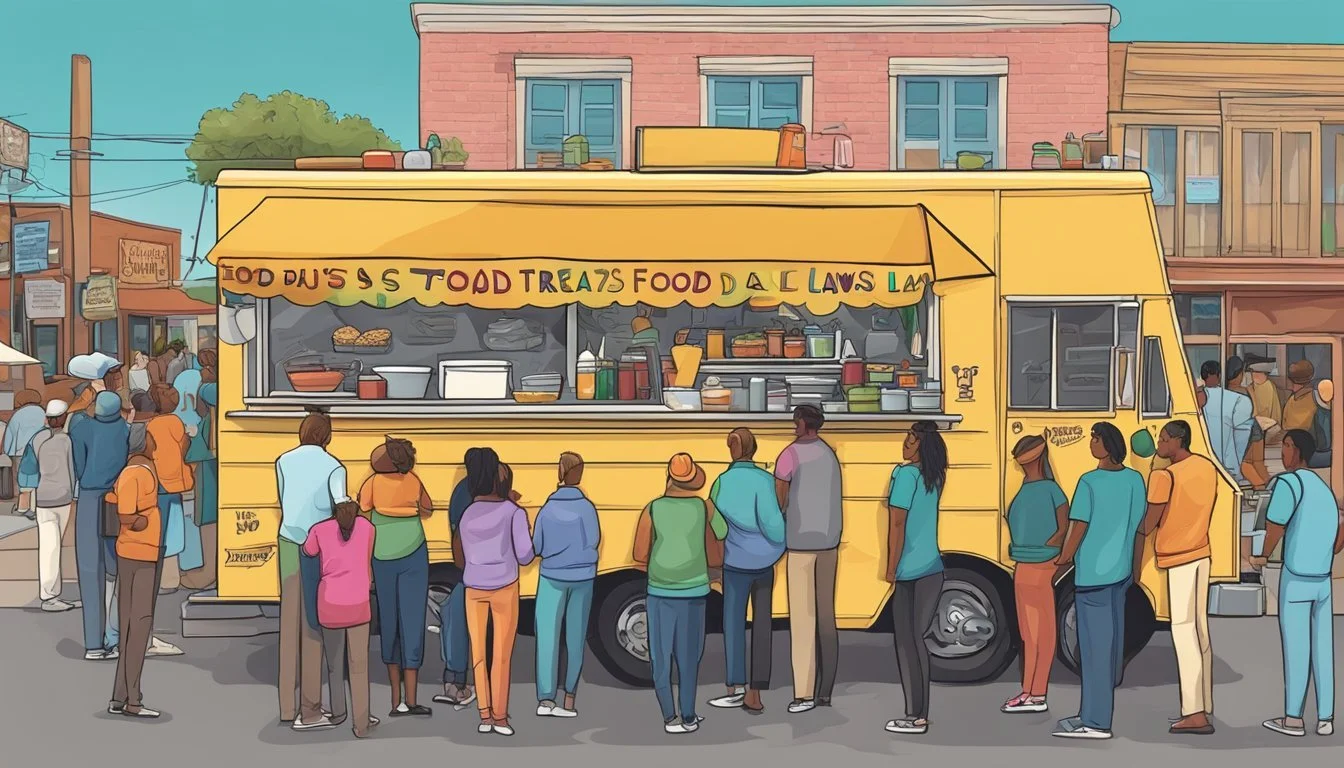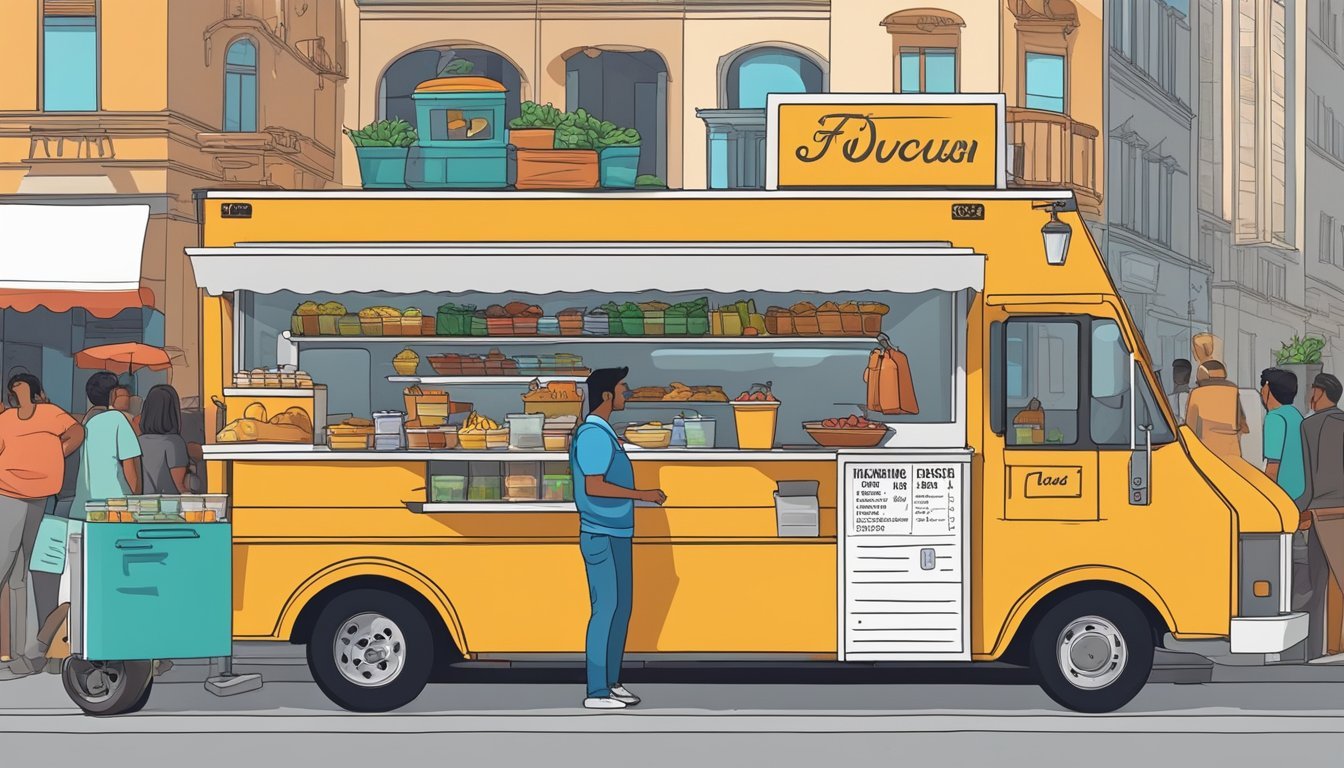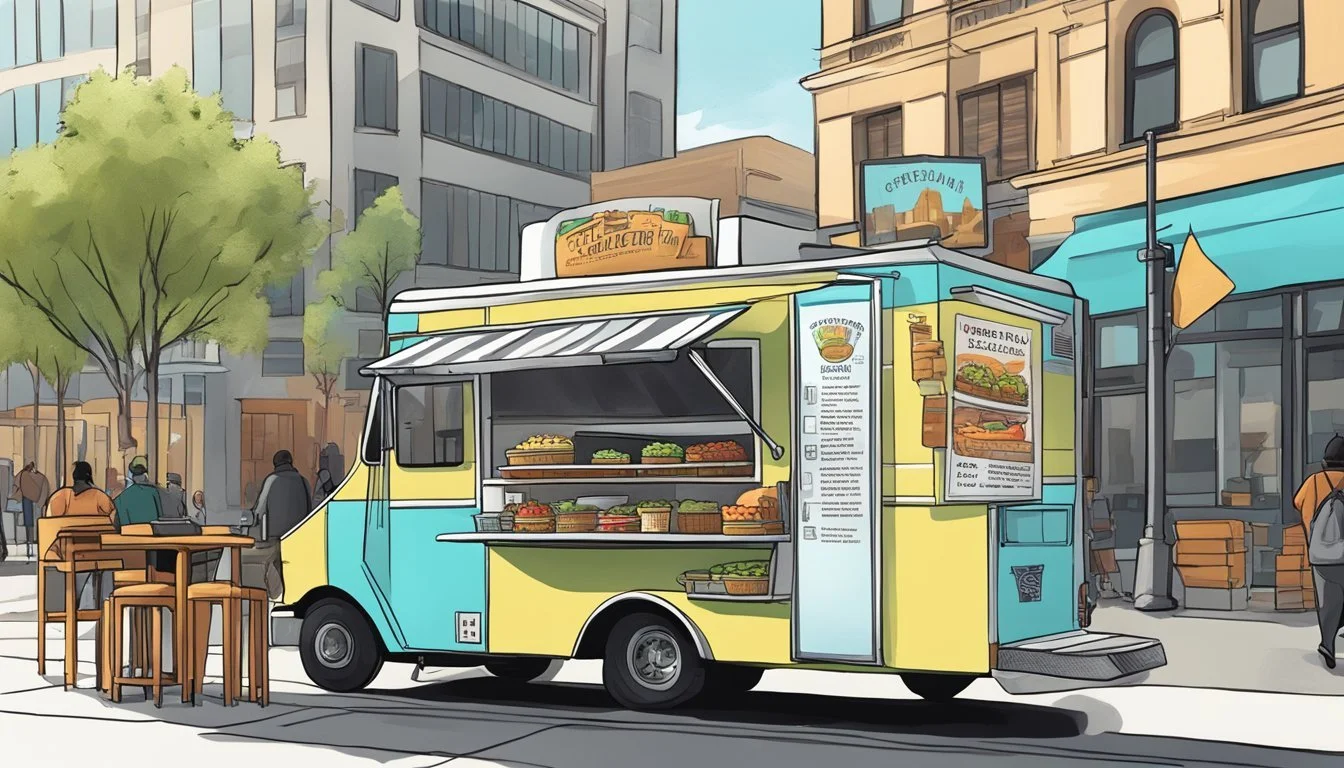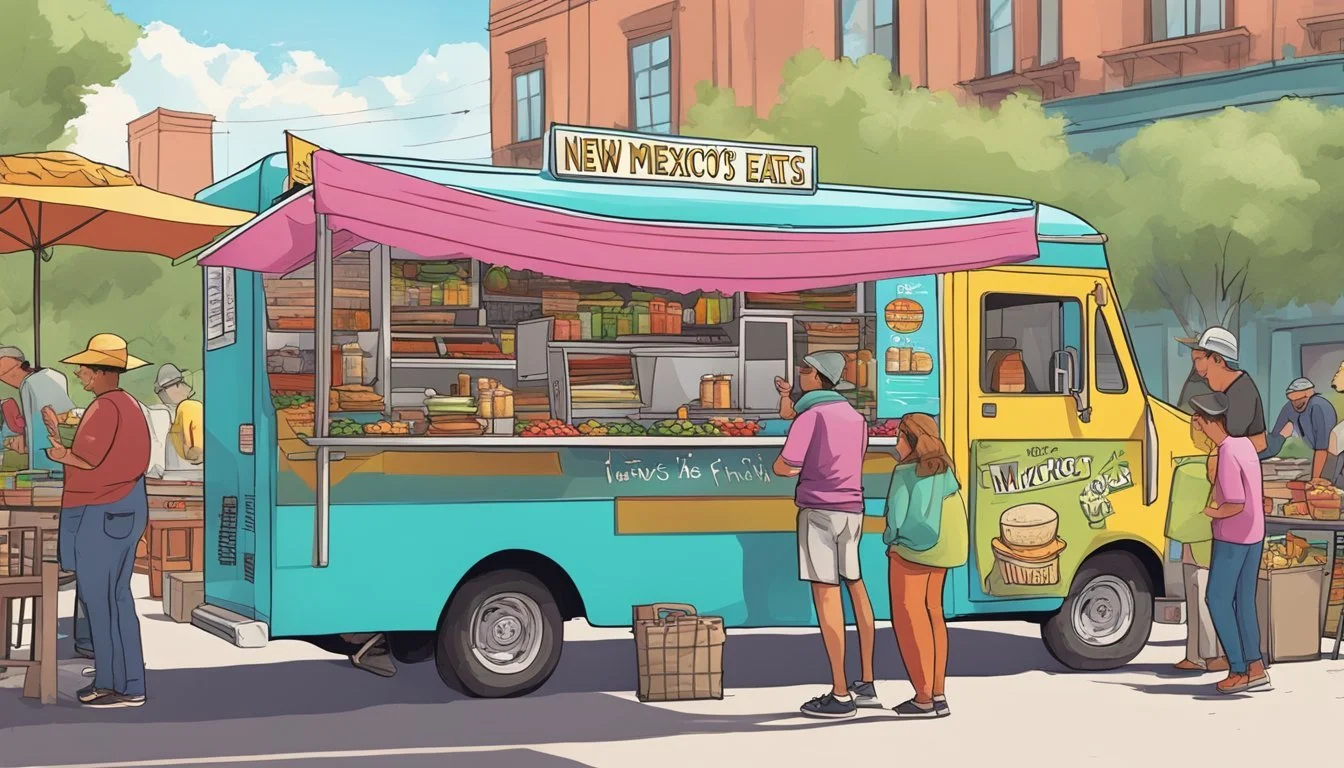Food Truck Laws in New Mexico
Regulations and Compliance Guide
Operating a food truck in New Mexico involves navigating a specific set of regulations to ensure public safety and compliance with state laws. Like all retail food establishments, food trucks in New Mexico are required to obtain proper licensing and adhere to health and safety standards, which are managed by the New Mexico Environment Department. Food truck operators must secure a range of permits such as a Mobile Food Facility Permit and a Sellers' Permit before they can legally vend food to the public.
In addition to state-level requirements, local municipalities may have their own set of guidelines that food truck owners must follow. These can include varying rules on zoning, parking, and hours of operation. It's important for food truck entrepreneurs to understand the laws and regulations specific to the area where they plan to operate. This ensures they avoid potential fines and business disruptions.
For food trucks serving alcohol, there's an additional layer of regulation, including obtaining a Liquor License. The intricate framework of food truck licenses and permits needed in New Mexico is designed not just to uphold safety standards but also to create a structured and fair marketplace for all food service providers. Compliance with these regulations is crucial for the ongoing success of food trucks within the state.
Establishing a Food Truck Business
Before a food truck business can park and begin serving delicious street food in New Mexico, several legal steps are imperative. The entrepreneur must decide on the business structure, register their business, and ensure all tax-related documentation is correctly filed.
Choosing the Business Structure
An individual planning to establish a food truck business has several business structures to consider, each with its own implications for liability, taxation, and operation. A sole proprietorship is the simplest form, with no distinction between the business and the owner, making set up easier but leaving the owner personally liable for debts and legal actions. A partnership functions similarly but involves two or more people sharing profits and liabilities.
An LLC (Limited Liability Company) offers protection of personal assets from business debts and liabilities, making it a popular choice among food truck entrepreneurs in New Mexico. To create an LLC, one must file Articles of Organization with the New Mexico Secretary of State.
Registering the Business
After choosing a business structure, the next step is registering the business. This process involves selecting a unique business name and filing the necessary paperwork with the New Mexico Secretary of State. For LLCs, partnerships, and corporations, this will establish the legal entity that can then be used to obtain the required business licenses and permits.
Tax Registration and EIN Acquisition
Lastly, a food truck business must register for taxes with the New Mexico Taxation and Revenue Department. They will provide a Combined Reporting System (CRS) ID number, which serves as a state tax ID for managing state tax obligations.
Businesses with employees, or those structured as an LLC, partnership, or corporation, must obtain an Employer Identification Number (EIN) from the IRS. The EIN is crucial as it is used for a variety of business needs, including filing federal taxes, opening a bank account, and applying for business licenses. One can apply for an EIN via the IRS website.
Obtaining Necessary Permits & Licenses
In establishing a food truck business in New Mexico, operators must navigate various permitting processes to ensure compliance with state and local regulations. This section delineates the types of permits and licenses necessary to legally operate a food truck business within the state.
General Business Permits
Every food truck business in New Mexico starts with the general business permits. Prospective operators should apply for a Seller's Permit, which is mandatory for all businesses selling goods within the state. Additionally, a New Mexico Combined Reporting System (CRS) Number is necessary for tax purposes. The local county office should be contacted for any required zoning permits relevant to food truck operation.
Food Service and Health Department Permits
Moving beyond general business requirements, obtaining Food Service and Health Department Permits is crucial. A Mobile Food Facility Permit is likely the first step, followed by a Public Health Permit, which verifies the food truck meets health standards. Each local jurisdiction may have specific health and safety inspection requirements. Therefore, coordination with the New Mexico Environment Department and local health departments is vital during the application process.
Specialized Permits
Some food trucks may require Specialized Permits depending on their service. For instance, trucks that plan to serve alcohol must secure a Liquor License, which involves a separate application process and specific regulations. Additionally, a food service license is necessary for all mobile food vendors to operate. It is imperative to remain aware of and adhere to the distinct requirements set forth by the New Mexico Alcohol and Gaming Division as well as the local public health offices.
Compliance with Health & Safety Regulations
In New Mexico, operating a food truck demands adherence to specific health and safety regulations to prevent foodborne illnesses and protect public health. These regulations are enforced by entities such as the New Mexico Environment Department and local health agencies.
Food Safety and Handling
Food truck operators in New Mexico must ensure all food is stored, prepared, and served in ways that meet food safety standards. They require a Mobile Food Facility Permit and must operate in compliance with the New Mexico food safety regulations, which include maintaining proper temperature control and preventing cross-contamination.
Inspections and Certifications
Regular inspections are a critical part of compliance. These include initial and routine assessments by the New Mexico Environment Department or the local health department. To pass these inspections, food trucks must be equipped with the necessary facilities to ensure sanitation and must comply with all local and state health codes.
Training and Certifications for Staff
All food handlers in New Mexico are required to obtain a food handler card, demonstrating they have completed food safety training. At least one employee on-site must have a Certified Food Protection Manager certification. The ServSafe program is one provider of such certifications, ensuring staff are trained to prevent foodborne illnesses and understand food safety practices.
Operational Guidelines for Food Trucks
Food trucks in New Mexico are subject to stringent operational guidelines to ensure food safety and quality. Compliance with these standards is critical for the success and sustainability of these mobile food businesses.
Food Preparation Standards
Food trucks must adhere to established food preparation protocols. This includes strict time and temperature control to prevent foodborne illnesses, particularly for safety-sensitive items such as dairy products, poultry, meats, and fish. They must document and maintain specific temperatures at which food must be kept, from preparation to service. Use of utensils and equipment must also adhere to the hygienic standards, and employees should be trained to handle ingredients and final products in a manner that avoids cross-contamination.
Safe Temperature Ranges:
Cold foods: below 40°F
Hot foods: above 140°F
Handling Specific Types of Food
For food items like shellfish (What wine goes well with shellfish?) or raw milk, special regulations apply. New Mexico mandates that these foods must be sourced from reputable suppliers and handled with the utmost care. Menu items featuring raw or undercooked ingredients should be properly identified to inform customers. Additionally, food trucks must obtain and display permits for the handling of certain high-risk foods.
Shellfish Tags Retention: Last date of sale plus 90 days
Consumer Advisory: Clear signage for undercooked food
Maintaining Equipment and Facilities
The maintenance of facilities is crucial. This includes ensuring that all preparation and service areas are clean and that a fire suppression system is in place and operational. Utensils and service equipment must be sanitized properly, and the team should conduct regular checks to ensure everything is in working order. Control measures should be implemented for waste disposal and wastewater, with clear protocols for cleaning and maintaining the cooking and serving spaces.
Daily Cleaning Checklist:
Cooking surfaces: Each use
Utensils: After each task
Service areas: Daily
Each food truck requires a detailed understanding of these operational guidelines to not only comply with legislation but to ensure they are providing the safest and highest quality service to their customers.
Jurisdiction-Specific Requirements
In New Mexico, food trucks are governed by a tapestry of regulations that vary from statewide mandates to county-level nuances. The distinctions between state oversight and local ordinances are critical for compliance.
State vs. County Regulations
The state of New Mexico sets baseline requirements for food trucks, which include obtaining a Mobile Food Facility Permit and an Employee Health Permit. These permits ensure consistent standards for food safety and employee wellness across all jurisdictions in the state. However, operators must be aware that counties can impose additional regulations, which augment state laws. For example, Bernalillo County may have unique guidelines on top of the state's foundation of health and safety protocols.
Major Cities and Regional Considerations
When it comes to major cities such as Albuquerque, food truck operators must navigate an additional layer of requirements. They must secure a food service license, a mobile food license, and sometimes, a transient merchant permit, as they do not just cater to a fixed location but traverse various neighborhoods. The city's ordinances can be more stringent than those at the county level, focusing on the distinct needs of a densely populated urban environment. Food establishments, including food trucks within this jurisdiction, need to conform to localized health codes, parking regulations, and zoning laws specific to Albuquerque.
Participation in Events and Festivals
Food truck operators in New Mexico must navigate a series of regulations to participate in various events and festivals. Obtaining the correct permits and adhering to event-specific guidelines are crucial for lawful operation and success.
Securing Event Permits
To operate at events, food trucks must first obtain a temporary event permit or a special event permit. These permits are often required for individual events, although some jurisdictions may offer a permit that covers multiple events. For instance, the City of Albuquerque allows vendors to secure a single permit for participation in multiple markets. Operators must apply for these permits through the local health department or regulatory agency—each with its distinct application process and fee structure.
Temporary Event Permit: Typically required for a single event
Special Event Permit: May cover multiple events or a series of dates
Following Event-Specific Regulations
Beyond general food service and health regulations, food trucks must adhere to additional event-specific regulations. These can vary widely from one event to another and may include location-specific rules, waste disposal requirements, and fire safety measures. Fire suppression systems, for example, are crucial for mitigating fire-related risks and often mandated by local jurisdictions. For events like fairs or festivals, the organizers might have further stipulations to ensure the safety and compatibility of all participating vendors. It is incumbent upon food truck operators to familiarize themselves with and follow these regulations to maintain compliance and safety.
Marketing and Customer Engagement
Effective marketing and customer engagement in the food truck industry hinge on a distinctive brand identity and deep community connections. These elements not only attract new customers but also foster loyalty, helping your food truck stand out in New Mexico's vibrant food scene.
Developing a Brand and Menu
Crafting a compelling brand for a food truck is crucial. The brand should be visually appealing and reflect the unique menu items offered. Signage and logo designs must be eye-catching to draw the attention of potential customers. The menu should mirror the brand's voice, showcasing specialties and enticing descriptions. For example, a food truck specializing in New Mexican cuisine might use bold colors and southwestern motifs in their branding, coupled with a menu that features Green Chile Cheeseburgers prominently.
Connecting with the Community
Food trucks thrive when they actively engage with their local communities. Participation in community events, from food truck rallies to local festivals, can broaden the customer base and embed the food truck into the local culture. Utilizing online platforms to update customers about locations and events has proven effective for maintaining customer relationships. Additionally, partnerships with local breweries or businesses can create mutually beneficial relationships and tap into existing customer loyalty.
Financial and Legal Considerations
When initiating a food truck business in New Mexico, proprietors must navigate through a myriad of financial and legal obligations. Adherence to sales tax regulations and securing adequate liability insurance are fundamental to safeguard one's business and comply with state laws.
Understanding Sales Tax Requirements
All food truck owners in New Mexico must register with the New Mexico Taxation and Revenue Department to obtain a Combined Reporting System (CRS) number. This identifier is used to report and pay sales tax, which is a requisite for all vendors making transactions within the state. It is imperative that food truck operators regularly collect, report, and remit the correct sales tax rates, which may vary by location. Failure to comply with these regulations can result in penalties and interest charges.
Ensure registration for a CRS number
Collect, report, and remit sales tax in compliance with the local rates
Obtaining Liability Insurance
The necessity of obtaining liability insurance cannot be overstated for New Mexico food truck businesses. Insurance is not only critical for protecting the venture against potential claims arising from accidents, injuries, or negligence but is also a legal requirement. Food truck owners should procure a comprehensive liability insurance policy to cover various risks, including property damage and bodily injury to others. This coverage serves as a safeguard for the business's financial and operational well-being.
Obtain comprehensive liability insurance
Protection against claims of property damage and bodily injury
Vehicle Requirements and Maintenance
In New Mexico, food truck operators must adhere to stringent vehicle safety standards and sanitation protocols to ensure safe food preparation and delivery. These regulations are designed to preserve public health and ensure that food service is carried out in a clean and reliable environment.
Ensuring Vehicle Safety
Food trucks in New Mexico are required to pass regular vehicle safety inspections
Legal Responsibilities of Food Truck Owners
Operators of food trucks in New Mexico are obligated to adhere to stringent licensing and inspection protocols while also ensuring that they comply with employment laws.
Navigating Licensing and Inspections
Before launching a food truck, owners must obtain the necessary licenses and permits to operate legally within the state. The primary license required is a Mobile Food Facility Permit which allows for the legal operation of the food truck. Food truck owners are also required to secure a Public Health Permit and often a Seller's Permit. Additionally, the presence of alcohol on a food truck necessitates a Liquor License. Compliance with these regulations necessitates owners to administer and control various aspects of their operation to meet state standards. Inspections are a critical part of the licensing process, as food trucks must pass a health inspection conducted by the New Mexico Environment Department. During these inspections, officials examine food handling, storage, and preparation to ensure public safety.
Upholding Employment Laws
Food truck owners also assume the role of an employer, which involves the responsibility of upholding employment laws. This includes providing a Employee Health Permit for each individual they employ. They must ensure that the person who has supervisory and management responsibility, and the authority to direct and control food preparation and service, is a Certified Food Protection Manager. Food truck operators in New Mexico have to stay current with state regulations, manage their teams according to employment standards, and maintain food safety protocols to remain in compliance with the law.
Operating Hours and Location
Operating a food truck in New Mexico involves understanding the nuances of when and where one can do business to ensure compliance with state and local regulations.
Determining Hours of Operation
Food truck entrepreneurs must wisely decide their hours of operation to align with customer demand and legal allowances. These hours are often dictated by the specific permissions granted by the local governing bodies. For instance, a food truck parked at a vibrant downtown location on weekdays might opt for lunch hours, while late-night service could be ideal in entertainment districts during weekends.
Location Strategy and Zoning
Choosing the right location is critical for a food truck’s success, making a thorough zoning permit process a fundamental step. Operators must obtain approval from local zoning authorities to set up in designated areas, which can vary widely across municipalities. It’s advisable to investigate and adhere to local zoning regulations, as these will determine permissible locations and may influence both foot traffic and operating hours.
Managing Employees and Operations
In New Mexico, food truck owners must navigate various requirements to ensure their operations run smoothly. This involves not only complying with licensing and food safety standards but also effectively managing staff and operational workflows.
Staffing and Training
For every food truck in New Mexico, having a well-trained staff is essential for compliance and success. Every employee must undergo a specific training program to meet the state's food handling regulations. A Person in Charge (PIC) should be designated to oversee the training and ensure all standards are met.
Training Essentials:
Food safety and hygiene procedures
Proper handling and storage of food products
Emergency response protocols
Optimizing Workflow and Processes
To maintain efficient operations, food trucks should optimize their workflow through well-defined processes and the strategic assignment of roles. Each employee should have a clear understanding of their responsibilities, which helps minimize delays and errors.
Workflow Strategies:
Streamlined station setup for prep, cooking, and serving
Regular maintenance schedules for equipment
Inventory management systems to track supplies and reduce waste
By focusing on comprehensive training and efficient workflow management, food truck operators in New Mexico can create a stable platform for business growth and regulatory compliance.
Conclusion
Food truck entrepreneurs in New Mexico navigate a distinct set of laws and regulations to ensure their mobile enterprises operate within legal bounds. This mirrors the compliance required of traditional restaurants and bars. New Mexico mandates that food trucks obtain specific licenses and permits, which may include:
Mobile Food Facility Permit: Validating mobile operation requirements.
Public Health Permit: Ensuring adherence to health and safety standards.
Seller's Permit: Authorizing sales within the state.
Potentially, Liquor License: For those serving alcohol.
Employee Health Permit: Certifying the health of the staff.
The state's regulations serve to safeguard public wellness, while also framing the business environment in which food trucks thrive. The legal prerequisites are in place not just for compliance but to encourage a prosperous and professional food truck scene.
It is pertinent for food truck operators to remain informed and up-to-date with the local jurisdictional ordinances, as these laws can vary. Staying conversant with the latest regulations—such as those provided by the New Mexico Food Code—is crucial for enduring success.
By fulfilling all legislative requirements, food trucks in New Mexico not only contribute to the gastronomic diversity but also drive forward the local economy, reinforcing the state's expanding food culture landscape.











